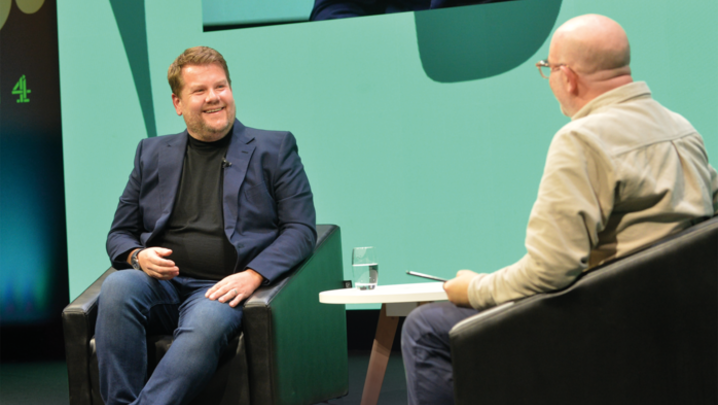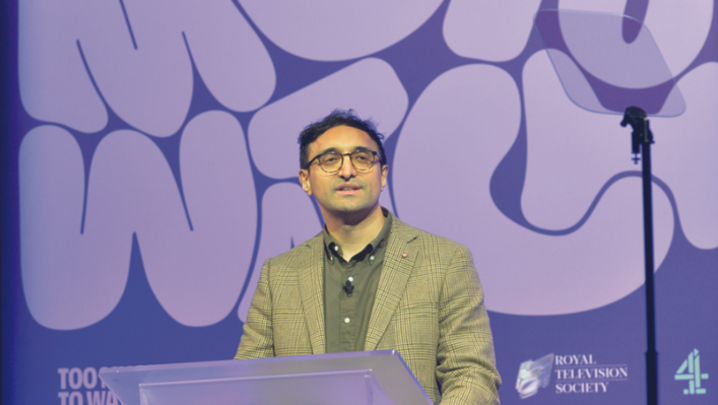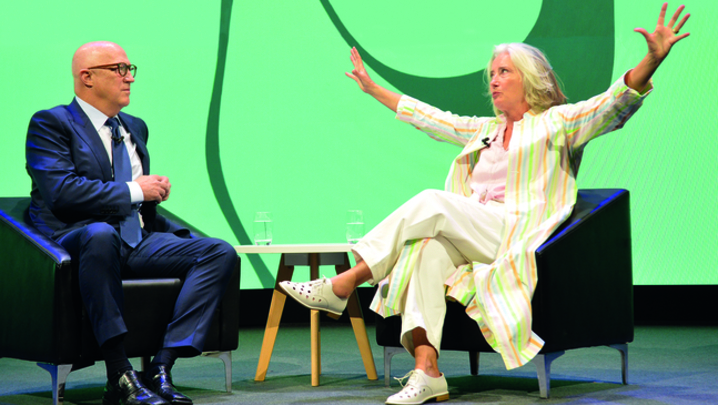Young people in production are routinely bullied and harassed, made to work punishingly long hours and do jobs they were not hired for. Caroline Frost investigates.
"Television documentaries changed me and inspired me when I was growing up and, as an adult, I wanted to be part of that,” one young researcher tells me.
“I’m from a working-class background, and working in factual TV, bringing people’s stories to screen, that is no small thing. It’s incredibly important to a lot of people,” says another.
British television has long enjoyed a reputation for being the best in the world, and a role in this industry is the stuff of many young creative people’s dreams. Unfortunately, for many, such ambitions are increasingly being tempered or even destroyed by the reality of the day-to-day pressures and expectations across different areas of production.
While incidents of bullying and harassment are being talked about more openly in the wake of allegations against Noel Clarke and others, I discovered something less headline-grabbing but more widespread for those starting out and hoping to make their way up the ladder: the incredibly long, undocumented and thankless hours everyone is expected to work.
'You can’t throw a stone… without hitting somebody with a horror story to tell’
I interviewed a mix of male and female professionals, spread across different TV genres, in production and post-production roles, both office and location-based. And all who spoke to me – anonymously – were emphatic that this way of working is everywhere. One told me: “You can’t throw a stone in this industry without hitting somebody with a horror story to tell. It’s an industry-wide epidemic.”
“If you’re in the production office and you’re contracted 9:00am to 6:00pm, you can expect to add an hour either side of that,” explains Sarah, who has worked in factual TV for a decade. “There’s an etiquette of being seen to stay as late as possible. Occasionally, an email will go out at the beginning of a project, ‘Don’t expect to make plans at the weekend’. But, more often, it’s not explicitly said, it’s just an expectation that everyone’s aware of.”
Location set-ups are no better, according to Miles, who’s worked consistently as a runner, then researcher, on TV documentaries since graduating in 2017. He explains: “You receive your call sheet – often around 9:00pm – for the following day, and you laugh when you read the words ‘Wrap 7:00pm’. You already know you’ll never hit that time. To even attempt to finish by 9:00pm means going without a lunch break.”
For him, the problem is in the small print of almost every freelance contract, a copy of which he shows me. It has the line: “You will be expected to work such additional hours as may be reasonably necessary for the proper performance of your duties”, as well as a stipulation that the freelancer opts out of the 1998 Working Time Regulations. Apparently, “reasonably necessary” is interpreted to mean: whatever the producer wants, they get.
On the relatively low daily rates for runners and entry-level production staff, all those extra worked hours mean the hourly rate gets lower and lower, to the point where it dips below the minimum wage. Are staff offered compensation at that point? “Try having that conversation,” scoffs Miles.
'We don’t even want the overtime. We just want to be able to go to bed’
With specialist skills come equal amounts of pressure. When I speak to John, well established as a graphic designer, mostly in big-budget drama, he has worked until 11:00pm the night before – trying desperately to source and design the right branding for a police vehicle, ahead of a day’s shoot costing £100,000. “They won’t cancel it, so it’s all resting on me, and it’s not even my actual job,” he explains.
This is no rare event, it seems. “I’ve been on productions where the showrunner has changed his mind at 7:00pm about what’s required on set,” he says. “That means us staying until 10:00pm and being back on set at 5:00am. No one says no to the showrunner.”
What happens if someone does actually say no to the bosses? “It’s a freelance world, very competitive, and, if you stand up to them, it looks like you’re not committed or you can’t handle it,” says Sarah. “You get the tag of ‘difficult person’, and it means that you’re less likely to get a follow-up gig with the same producers.”
“You’re made to feel very guilty for even saying anything,” says Miles. “And you’re constantly reminded, ‘This is a great opportunity for you’.”
“It’s not about the money,” John adds: “For most of us, we don’t even want the overtime. We just want to be able to go to bed.”
All this pressure can lead to outcomes worse than not getting the next gig. Everyone I speak to reports fatigue, stress, sickness and worse – one ended up missing his grandfather’s funeral due to work, something he deeply regrets.
Everyone I speak to has either experienced or witnessed both bullying and harassment. One time, Sarah was invited to a meeting where it was made clear she wasn’t expected and someone told her to leave, saying, “Let the adults have a conversation”. She still smarts at the memory. “When I spoke up about it upsetting me, I was told I’d blown it all out of proportion. They effectively gaslit me. It didn’t feel particularly personal, just dismissive.”
When a producer shouted at Miles on location, it was the latter who ended up being the one to say sorry. “When a colleague asked me if I wanted to complain, I refused,” he remembers. “I didn’t want to be someone seen to be making a fuss. I knew I’d be the one to lose my job. We were a team living on location for weeks, and I didn’t want the relationships affected. I ended up apologising just to get through the next month.”
Every interviewee agrees that junior female staff across the industry receive the brunt of misogynistic treatment – “literally thousands of incidents, it’s just a given, you don’t even bother reporting it” – and harassment – “there are loads of sex pests, we just try to warn everyone in advance who to avoid”. John adds that young men and women alike are potentially on the end of more subtle bullying – what he calls “emotional manipulation”. He describes one manager telling him: “I thought you were the guy for this job but clearly not.”
For all these exhausted young professionals, there is no single individual villain responsible for their distress. Instead, they describe a system where TV has become a victim of its own “golden age” success. Companies, particularly those making drama, are now expected to produce up to eight hours of high-quality content in six months compared with, say, companies creating two hours of film in the same period.
John describes something he calls “miracle drift”: where shooting schedules with tight deadlines and small budgets were honoured through the sheer willpower of staff – “they pulled off a miracle”.
This superhuman endeavour then becomes the norm, with producers increasingly factoring in unpaid work by the least experienced of their staff. For example, if they can persuade that day’s location assistant to turn data wrangler by evening, working in his hotel room until late and embracing such an “industry opportunity”, that’s one less salary they have to pay.
“They rely on the fact that we’re all passionate about our work, so they’ll always get the hours out of us,” says Sarah. She calls it “the tightening of the screw”, particularly in an industry where the most elastic piece of resource is never the camera operator, the electrician or construction worker, all rightly protected by union rules, but those younger and newer, most keen to get on.
‘Young people are forced to keep their heads down, work hard and hope for the best’
By contrast, the latter aren’t as tightly unionised, their rates aren’t advertised, and some I spoke to are hesitant to spend their hard-earned cash joining a union without being sure that their rights will be protected.
For those feeling brave or desperate enough to make a complaint, who can they go to?
“You’re on your own,’ says Sarah, particularly referring to smaller independents, where the owners are running the show, or their friends are. Another young freelancer explains: “There are rarely HR departments or people you feel comfortable talking to confidentially without it impacting your future jobs.”
With all these unwritten promises, threats and codes in place, what single practice would make the biggest improvement to the working day of young people in TV?
“Transparency around hiring,” offers Sarah. “Most people are recruited through connections, without any HR procedure. If that could be formalised, it would make speaking up much easier. You’d have a point of contact from the beginning.”
“Acknowledge all those extra hours,” says Miles. “Remove that clause that signs away our rights and instead pay everyone overtime. Money talks.”
“Build schedules over a longer time with shorter hours,” says John. ‘There will be happier people, fewer mistakes and the end result will be better.”
In the meantime, though, young people are forced to keep their heads down, work hard and hope for the best. This kind of back-breaking experience used to be seen as a rite of passage for those wanting to crawl to the top of the industry, with such trench experiences all good fodder for the pub afterwards and part of the glamour of TV.
However, it seems the production hiatus created by lockdown has given people time to reflect. “Regularly, people now get to Thursday evening and they announce, ‘I’m off’.” reveals John. “They’d rather give up than carry on like this. Bad days used to be the exception, now they’re the norm.
“Recently, I saw a tweet by a colleague. It just said, ‘I’m broken’.”
All names in this article have been changed.







